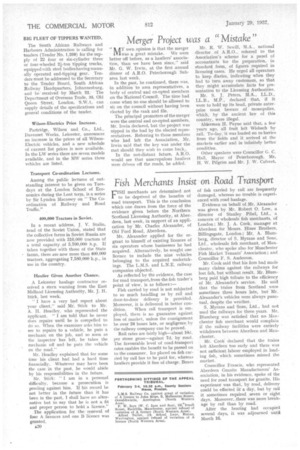Fish Merchants insist on Transport
Page 32

If you've noticed an error in this article please click here to report it so we can fix it.
FISII merchants are determined not to be deprived of the benefits of road transport. This is the conclusion which one draws from the force of the evidence given before the Northern Scotland Licensing Authority, at Aberdeen, last week, in support of an application by Mr. Charles Alexander, of Old Ford Road, Aberdeen.
Mr. Alexander applied for the regrant to himself of existing licences of six operators whose businesses he had acquired. Alternatively, he sought one licence to include the nine vehicles belonging to the acquired undertakings. The L.M.S. and L.N.E. railway companies objected.
As reflected by the evidence, the case for road transport,from the fish trader's point of view, is as follows : Fish carried by road is not subjected to so much handling as by rail and door-to-door delivery is provided. Moreover, it is delivered in better con
dition, When rail transport is employed. there is no guarantee against lass of market, unless the consignment be over 24 hours late, or negligence. by the railway company can be proved.
Rail rates are fairly high—about 10d. per stone gross—against 7d. by road. The favourable level of road-transport rates enables the benefit to be passed on to the consumer. Ice placed on fish carried by rail has to be paid for, whereas hauliers provide it free of charge. Boxes of fish carried by rail are frequently damaged, whereas no trouble is experienced with road haulage.
Evidence on behalf of Mr. Alexander was given by Mr. Robert 0. Low, a director of Stanley Pibel, Ltd., a concern of wholesale fish merchants, of London ; Mr. J. A. Cook, manager at Aberdeen for Messrs. Hines Brothers. Billingsgate, London ; Mr. A. Blumberg, director of S. Myrans and Sons, Ltd., wholesale fish merchant, of Manchester, who spoke also for Manchester Fish Market Tenants' Association ; and Councilor F. S. Anderson.
Mr. Cook said that his firm had made many claims against the railways for lost fish, but without result. Mr. Blumberg paid high tribute to the efficiency of Mr. Alexander's service. He said that the trains from Scotland were sometimes three hours late, but Mr. Alexander's vehicles were always punctual, despite the weather.
S. Myrans and Sons, Ltd., had not used the railways for three years. Mr. Blumberg was satisfied that no Manchester fish merchant would complain if the. railway facilities were entirely • withdrawn between Aberdeen and Manchester.
Mr. Cook. declared that the trains left Aberdeen too early and there was not sufficient labour employed in loading fish, which sometimes missed the market.
Councillor Francis, who represented Aberdeen Granite Manufacturers' Association, in his evidence, spoke of the need for road transport for granite. His experience was that, by road, delivery could be effected ill a day, but by rail it sometimes required seven or eight days. Moreover, there was more breakage by rail than by road.
After the hearing had occupied several days, it was adjourned until March 16.




















































































